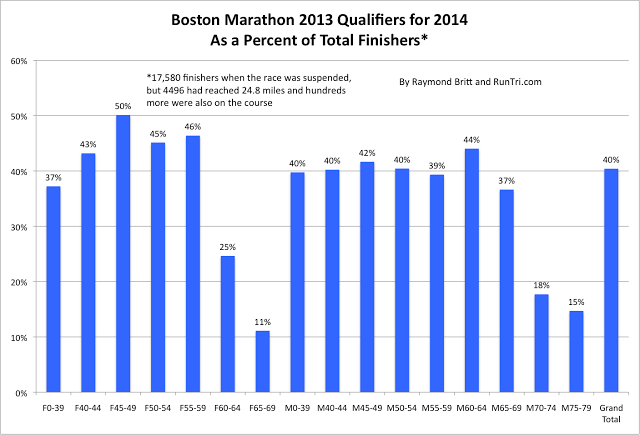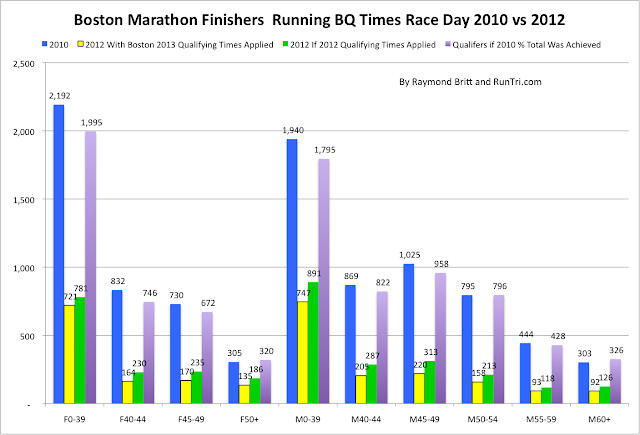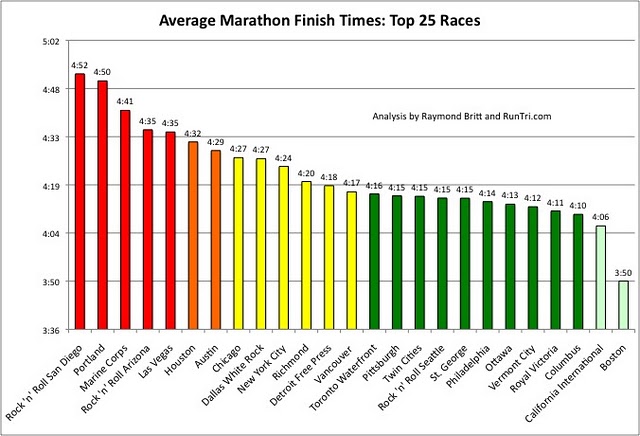By Raymond Britt -- There is nothing like it in the world. Boston. The Boston Marathon. You'll know what I mean when you get there. But you have to qualify first. We've qualified for and have run Boston 13 consecutive times, and this article takes the best of what I learned, analyzed, and put into action to earn those repeat trips to Boston. It also contains excerpts from our book Boston Marathon: The Legendary Course Guide; proceeds go to charity.
Here are the rules and regulations related to qualifying for Boston 2015, directly from the race's official site:
- For the 2015 Boston Marathon, qualifying times must be run on or after September 14, 2013
- The acceptance of official race entrants will be based on qualifying time, with the fastest qualifiers (in relation to their age and gender) being accepted first until the race is full
- All qualifying times are subject to review and verification
- Minimum age requirement for the Boston Marathon is 18 years of age on race day
- All standards below are based on official submitted net time
- The qualifying times below are based upon each athlete's age on the date of the Boston Marathon in which they are participating
- For a list of the top feeder races for the Boston Marathon, click here
- The Boston Marathon does not designate which races are official Boston Qualifying events. You must contact the race directly to see if they are certified

We've noticed this trend: an absolutely incredible volume of interest in qualifying for Boston 2014. It's on the order of 15 to 20 times greater than any point since 2008. Amazing.
We believe it's an extraordinary sign of the running community's desire to support Boston. They want to come to Boston in
| Featured by Competitor Magazine |
(Near-term implication for race directors: expect a huge surge in marathon entries from new runners wanting to qualify.)
For more, see Boston Marathon Trend: Skyrocketing Google Searches 'Qualify for Boston Marathon' and our analysis as featured by Competitor Magazine online.
Qualifying for Boston 2014 at Boston Marathon 2013
At the time Boston Marathon 2013 was suspended, 17,580 runners had finished, 4,496 runners had reached 24.8 miles and hundreds more may still have been on the course.
- Of the 17,580 finishers, according to MarathonGuide.com, 10,391 runners, or 59.1%, qualified for Boston 2014
- In 2010, the percent of Boston finishers that re-qualified for the 2011 race was 41%
- But . . . qualifying times in 2013 are 5 minutes faster than they were in 2010, and yet percent re-qualifiers are almost identical
- Further proof that the new 5-minutes-faster qualifying times translate into a field that also runs at least 5 minutes faster in Boston
 |
| Note: we do not have the breakout of qualifying results for age groups 0-34 and 35-39, which are combined above as 0-39 |
For 2013, qualifying times for all age divisions were reduced by 5 minutes (see table above). Continuing the above example, the M40-44 qualifying time is reduced from 3:20:00 to 3:15:00. This change may result in many fewer than 20,081 qualified entrants for 2013. For example, only 6% of Chicago Marathon 2011 finishers beat the new qualifying standard, compared to 8% (Women) and 9.2% (Men) who would have qualified if times hadn't changed.
Qualifying for Boston 2013 at Boston 2012
In years past, around 40% of Boston finishers ran fast enough to qualify for the following years' Boston Marathon. In 2012, only 13% beat the new qualifying times. But the heat was the primary factor in limiting re-qualifiers. If qualifying times hadn't changed for 2013, only 16% would have qualified.
- Total 2012 Entrants: 26,656 runners entered to run the 2012 Boston Marathon
- Qualified Runners in Entered in 2012 Race: 20,081
- Non-Qualified Runners: 6,575 runners received entry via charity or other entities
- Total Starters: 22,480 (16% of entrants did not start)
- Finishers: 21,554 (95.9% of starters); 8,966 Women, 12,588 Men (see 2012 Results Analysis for more detail)
- Average Finish Time: 4:18:27 (vs 3:51+ 12 Year Average; for more see Avg Finish Times by Age)
- Boston Finishers Who Ran a 2013 Qualifying Time: 13% overall vs 41% in 2010
The Boston Marathon has a long history of relationships with many distinguished charities that serve communities in a variety of ways. Each year, many of these charities are allotted a certain number of entries, which are generally distributed to individuals who raise money or perform other services for their selected charities. In the past, individuals who receive entry to the Boston Marathon via these charities were not required to meet qualifying time standards. For 2012 charity entry, a fundraising minimum of $4,000 seems to be the norm. You can learn more about charities participating in the Boston Marathon here.
Top 50 Races to Qualify for Boston
Most runners who qualify for Boston do so at one of these 50 races.
RunTri's 25 Toughest/Easiest Marathons
Some races are tougher than others, of course. See our Toughest/Easiest Marathon Analysis for more.
Average Finish Times by Age Group
Digging a little deeper into the overall average finish times above, we've defined average times by age group, for several races on the list. New York Marathon example. See our Stats and Analysis Page for more examples, including Chicago, Marine Corps, and PF Chang's Arizona marathons.
Qualifying for Boston: Chicago Marathon Race Pace Examples
Several of our qualifying runs took place on the Chicago Marathon course. Some races went according to plan, and others went bad, but survived the qualifying limit. Our actual mile-by-mile splits are below.
Predicting Your Full Marathon Time
Many who attempt to qualify will run a half marathon or two. The result from those races hold clues about whether your marathon time might meet qualifying standards. Planning your race strategy, you want to know what your marathon time might be based on your best half marathon. See our Marine Corps Marathon example.
Impact of Weather on Average Race Results
Yes, weather does impact race times, but Boston qualifying times make no exceptions. It's true, what they say -- faster marathons are run when conditions are under 55 degrees. See our Boston Marathon Example.
And more . . .
- Boston Marathon: Everything You Need to Know
- 2011 Race Results Analysis
- Race Strategy
- Race Pace Tips
- Qualifying for Boston at the Boston Marathon
- Finishers and Average Finish Times by City
- Average Finish Times by Age
- Finish Times Compared with New York City and Chicago
- Boston Books
- Photos
- FAQ
- Race Weather
- Course Map
























